What is the Thermic Effect Of Food and how it can help you with your nutrition goals
The thermic effect of food (TEF), often an overlooked component in the realm of nutrition and fitness, plays a crucial role in our overall energy expenditure. At Rebuild Health and Fitness, we believe that understanding TEF can provide valuable insights into optimising your diet and achieving your fitness goals.What is the Thermic Effect of Food?The thermic effect of food refers to the increase in metabolic rate that occurs after ingestion of a meal. Essentially, it is the energy required by our bodies to digest, absorb, and process the nutrients in the food we consume. This process involves several stages, including chewing, swallowing, producing digestive enzymes, and the metabolic functions required to transport and store nutrients. Each of these stages demands energy, which is why our metabolic rate temporarily rises post-meal.What Does TEF Do?TEF is one of the three main components of daily energy expenditure, the other two being basal metabolic rate (BMR) and physical activity. While BMR accounts for the energy used to maintain basic physiological functions at rest, and physical activity includes all forms of movement, TEF contributes to the calorie-burning process by simply eating and digesting food.The magnitude of TEF varies depending on the macronutrient composition of the meal:Proteins: Have the highest thermic effect, increasing metabolic rate by approximately 20-30% of the calories consumed. This means if you eat 100 calories of protein, around 20-30 calories will be used in processing it.Carbohydrates: Have a moderate thermic effect, around 5-10%. Thus, 100 calories of carbohydrates will require about 5-10 calories to process.Fats: Have the lowest thermic effect, roughly 0-3%. Hence, 100 calories from fats will only use about 0-3 calories for digestion and absorption.What Does TEF Mean for Your Nutrition?Understanding TEF can have practical implications for those aiming to optimize their nutrition for weight management or muscle gain. Here’s how:Weight Management: Incorporating a higher proportion of protein in your diet can enhance TEF, thus increasing overall energy expenditure. This can be particularly beneficial for those looking to lose weight, as the body burns more calories processing protein compared to fats or carbohydrates. Additionally, protein has a high satiety value, which can help in reducing overall calorie intake by curbing hunger.Muscle Gain: For those focused on building muscle, a diet rich in protein is essential. Beyond its role in muscle synthesis, the high thermic effect of protein ensures that a significant portion of the calories consumed is utilised in the metabolic processes, supporting a higher metabolic rate.Metabolic Boost: Regularly consuming meals that have a balanced macronutrient profile can lead to a steady increase in TEF, contributing to a more dynamic metabolism. This can be especially important as we age and our metabolic rate naturally declines.Key TakeawaysAt Rebuild Health and Fitness, we emphasise that while TEF is not the sole factor in determining energy expenditure, it is a significant one that can be leveraged for better health outcomes. By strategically incorporating higher-protein foods and balanced meals into your diet, you can take advantage of the thermic effect to boost metabolism, support weight management, and enhance muscle growth.In summary, understanding and utilising the thermic effect of food can transform the way you approach your nutrition. It’s not just about the calories you consume, but also how your body processes them. Embrace this knowledge to rebuild your health and fitness from the inside out, achieving a more efficient and effective path to your goals.
Previous Blogs


